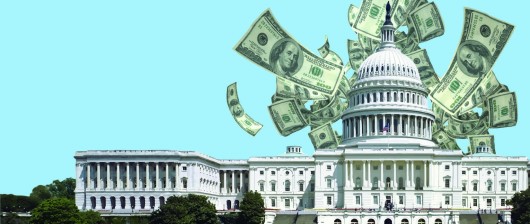Our nation purports to be a representative democracy, yet you don't find many plumbers, mineworkers, dirt farmers, Wal-Mart associates, roofers, beauty parlor operators, taxi drivers, or other "get-the-job-done" Americans among the 535 members of the U.S. House and Senate.
What you do find is an over-supply of lawmakers drawn from a very thin strata of America's population: Millionaires. In fact, the Center for Responsive Politics reports that last year -- for the first time in history -- more than half of our senators and House members are in the Millionaires Club. Indeed, the average net worth (the value of what they own minus what they owe) for all lawmakers now totals more than $7 million.
In short, the world in which our "representatives" live is light years from where the majority of people live, and the divide between the governors and the governees is especially stark for the 40 percent of people whose net worth is zero (or, technically, less than zero, since their income and other assets are far exceeded by their debts). This widening chasm is not just a matter of wealth, but most significantly a literal separation of the privileged few from the experiences, needs and aspirations of the many who're struggling to make ends meet and worried that opportunities for their children to get ahead are no longer available to them.
The harsh reality is that most Americans are no longer represented in Washington. Chances are that their own members of Congress don't know any struggling and worried people, share nothing in common with them and can't relate to their real-life needs. Thus, Congress is content to play ideological games with such basics as health care, minimum wage, joblessness, food stamps and Social Security.
Mark Twain once said, "I'm opposed to millionaires, but it would be dangerous to offer me the position."
One danger that such wealth brings is that many who have it become blinded to those who don't. So, the news that most of our congress critters are now in the millionaire class speaks volumes about why this institution of American democracy is so undemocratic. It has been striving ceaselessly to provide more government giveaways to Wall Street bankers, corporate chieftains and other super-wealthy elites, while striving just as mightily to enact government takeaways to harm middle-class and poor families.
Take, for example, Rep. Darrell Issa, with a net worth of $464 million last year. A far-right-wing California Republican, he has used his chairmanship of the powerful oversight committee to pound Obamacare's effort to provide health coverage for Americans who have been shut out of the system, even as he tried to unravel the new restraints to keep Wall Street bankers from wrecking our economy again. Issa and his ilk are proof that a lawmaker's net worth is strictly a financial measure, not any indication at all of one's actual value or "worthiness."
I hasten to note that many millionaires in American have been able to rise above their financial handicap, serving the public interest rather than self or special interests. For example, when Rep. Chellie Pingree was elected to Congress in 2009, she was an organic farmer and innkeeper in rural Maine. Definitely not a millionaire, she was a stalwart fighter for such progressive policies as getting corporate money out of politics, enacting Medicare for all and reigning in Wall Street greed. But in 2011, Pingree married -- of all people -- a Wall Street financier and was suddenly vaulted into the ranks of the 1-percenters. So, naturally, her legislative positions changed ... not one whit.
See, even in Congress, being a millionaire is no excuse for being a narcissistic jerk.




 The rich truly are different from you and me -- they tend to hold seats in Congress.
The rich truly are different from you and me -- they tend to hold seats in Congress.